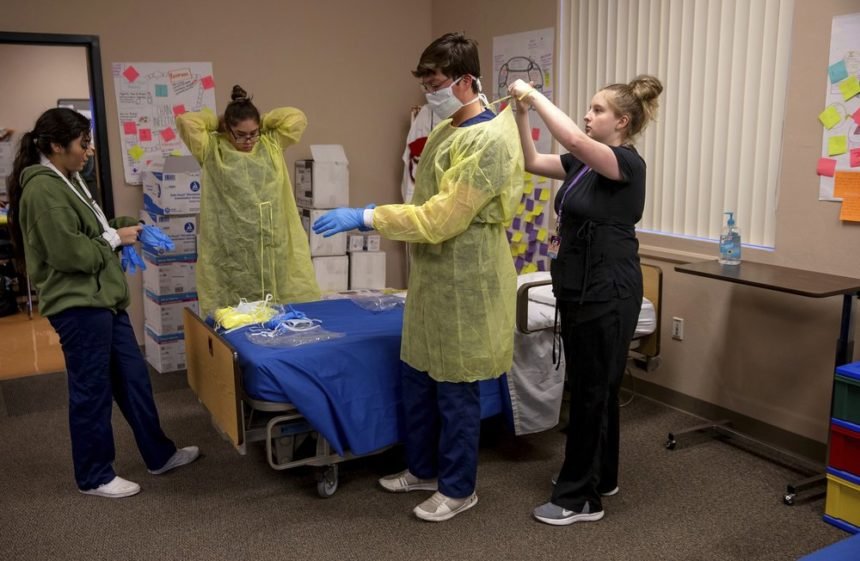Arizona health program moves to bolster ranks of caregivers

TUCSON, Ariz. (AP) — Faced with an expected shortage of in-home caregivers for older Arizonans, the state’s Medicaid program is working with insurers and other entities to provide training for entry-level workers, including high school graduates.
The Arizona Health Care Cost Containment System has contracted with Southwest Catholic Health Network Corp., Banner-University Family Care and United Healthcare Community Plan to build a long-term-care workforce within the AHCCCS network by 2024, the Arizona Daily Star reported.
State officials said the insurers will provide services to more than 26,000 AHCCCS members who are 65 and older, blind, or disabled and at risk of institutionalization.
The state Division of Developmental Disabilities is also part of the initiative.
The push includes supporting innovative high school-based technical education programs that prepare graduating seniors to enter the long-term-care workforce, said Heidi Capriotti, an AHCCCS spokeswoman.
The goal, Capriotti said, is to ensure that Arizona can meet the projected need for licensed and unlicensed caregivers in the coming decades.
Capriotti said officials are also supporting legislation on training and testing of direct-care workers and assisted-living caregivers to help increase career mobility and decrease training and hiring costs.
Southwest Catholic Health Network Corp.’s MercyCare has committed $2 million statewide to recruit, train, hire and retain between 6,000 to 10,000 new direct-care workers by 2022.
These workers would be employed to deliver services to Arizona Long Term Care System clients under AHCCCS, said Sarah Hauck, Mercy Care workforce development administrator.
“We’re aware that there are about 1½ million adults ages 60 and older living in Arizona, and that many of these individuals, and persons living with disabilities, are supported by informal caregivers,” said Hauck.
Arizona’s 60-and-older population is projected to grow more rapidly than any other in the state, with a nearly 43% increase by 2025 of individuals 65 and older living with Alzheimer’s,” Hauck said.
“It’s important to us that all of these individuals can live with dignity and as independently as possible,” she said. “Our investment in developing the home-health workforce is part of that commitment.”
Agencies awarded contracts in the Tucson area will work to recruit, train and improve retention among direct-care workers they employ, said Hauck.
These caregiver such as personal-care aides and home-health aides assist the elderly and physically disabled in their homes. Aides help with bathing, dressing, cooking, cleaning, laundry and running errands so clients can remain safely in their homes rather than move to assisted living or nursing facilities.
The jobs can be difficult because many elderly patients suffer from illnesses or cognitive impairments, and the pay often tends to be around minimum wage, with no employee benefits. Employee turnover is generally high.
In Arizona, nearly 41,000 new jobs for direct-care workers are expected to open by 2026, and about 1.4 million nationwide because of the rising demand as the U.S. population grows older, said Stephen Campbell, a policy analyst for the Paraprofessional Healthcare Institute.
A nonprofit based in New York City, the institute works to improve long-term services for the elderly and those with disabilities.
Arizona’s workforce development plan to recruit and retain direct-care workers “holds a lot of promise and added investment,” said Campbell.
Many of those who stay in the industry see the work as a calling and are passionate about it.
Brittany Marcello, 23, an instructor for a high school career and technical education district, said her grandmother was a nurse for five decades and her mother has worked in admitting and imaging at a hospital.
She said she stayed with her grandfather in the hospital after he was diagnosed with esophageal cancer and then helped with his hospice care at home.
“This solidified for me how much I wanted to help people,” Marcello said. “Something happens inside of you. I decided health care would be a part of me.”